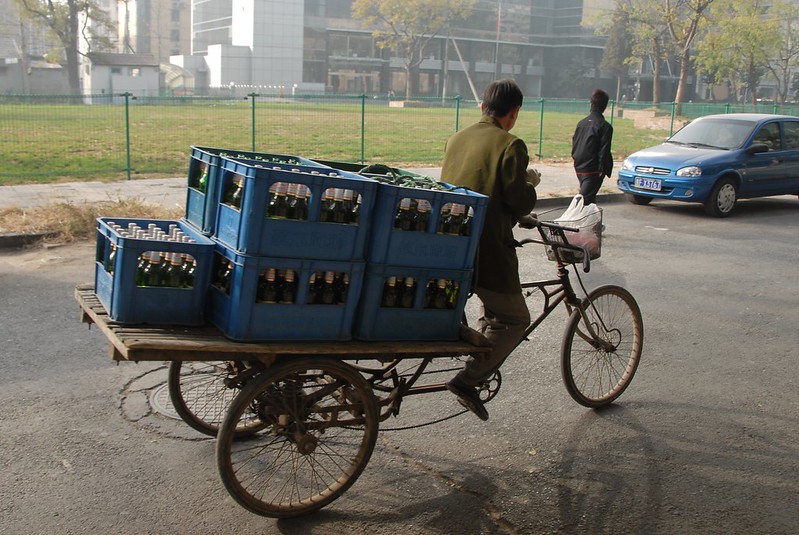Home Delivery of Alcohol in Florida

Many Florida alcohol vendors can make home deliveries, but not breweries and distilleries.
As part of the Florida government’s response to the COVID-19 pandemic, the governor temporarily authorized restaurants with a consumption-on-premises only license to sell alcohol for take-out or home delivery. This temporary measure has raised a broader question: What vendors are generally allowed to make home deliveries of alcohol?
Most Florida Alcohol Vendors Can Deliver to Homes
The Florida Beverage Laws provide that–with some important exceptions discussed below–licensed alcohol vendors can deliver to consumers homes. Florida Statutes Section 561.57 specifically addresses home deliveries of alcohol. It authorizes licensed vendors to treat orders received by telephone, by mail, or electronically in the same way as they treat orders in person. This means that any vendor licensed to sell beer, wine, or distilled spirits for consumption off premises can deliver those products to a consumer’s home.
Licensed vendors can make home deliveries in a vehicle owned or leased by the vendor. Alternatively, deliveries can be made by a third-party–including common carriers like the US Postal Service, FedEx, or UPS–under a delivery contract. Common carriers generally have strict limitations on delivering alcohol, but a number of companies–including Instacart, Drizly, and Minibar Delivery–actively delivery alcohol to customers’ homes.
Ordinarily, Florida restaurants with a Specialty Food Service (SFS, formerly SFX) license are authorized to sell beer, wine, and liquor for consumption on their premises only. Florida Executive Order 20-71 has lifted this restriction while the COVID-19 state of emergency is continuing. Accordingly, restaurants are allowed to make deliveries of alcoholic beveragtes in sealed containers accompanying sales of food within the same order.
Breweries Cannot Make Home Deliveries in Florida
Breweries cannot make home deliveries under the Florida Beverage Laws. This is true of breweries outside the state of Florida and Florida breweries. Even Florida breweries that have a vendor-licensed taproom are prohibited from making home deliveries either directly or through a third party deliverer.
Specific exceptions to Florida Three Tier System–which generally keeps manufacturers, distributors, and vendors separated–allow Florida breweries to have vendor licenses for the premises attached to their breweries. It is the statutory limitations placed on these exceptions that prohibits home delivery by breweries.
The “brewpub exception” (Florida Statutes Section 561.221(3)) allows beer produced on the premises to be sold for consumption on premises only. The executive order which allows SFS licensed restaurants to temporary sell alcohol for consumption off premises does not provide similar relief for brewpubs.
The “taproom exception” (Florida Statutes Section 561.221(2)) does allow a brewery’s beer to be sold for consumption off premises. There is no problem with a customer carrying out a growler, crowler, or other packaged products. But the subsection of the statute that allows taprooms specifically states:
A manufacturer possessing a vendor’s license under this subsection is not permitted to make deliveries under [Florida Statutes Section] 561.57(1).
Florida Statutes Section 561.221(2)(d) (2020)
That is, the specific statute that allows other vendors to make home deliveries–Section 561.57–expressly does not apply to brewery taprooms. Section 561.57(1) itself reiterates this further:
A manufacturer possessing a vendor’s license under [Florida Statutes Section] 561.221(2) is not permitted to make deliveries under this subsection.
Florida Statutes Section 561.57(1).
Distilleries Cannot Make Home Deliveries in Florida
Distilleries cannot make home deliveries in Florida because, under current law, distilleries are not authorized to be licensed as vendors. Craft distilleries (those that product fewer than 75,000 gallons per year) are permitted to make limited sales to consumers, but they do so without a vendor license. Florida Statutes Section 565.03 allows craft distillery gift shops to sell products in face-to-face transactions only. Section 565.03 specifically states:
A craft distillery may not ship or arrange to ship any of its distilled spirits to consumers and may sell and delivery only to consumers within the state in a face-to-face transaction at the distillery property.
Florida Statutes Section 565.03(2)(c)4. (2020)
Wineries, Cideries, and Meaderies Can Make Home Deliveries in Florida
Wineries that have a vendor license are permitted to make home deliveries just like other licensed vendors in Florida. For purposes of the Florida Beverage Laws and regulations, wineries includes manufacturers of fruit wine, cider, and mead.
Like Florida breweries, Florida wineries are allowed to have a vendor-licensed “tasting room” pursuant to a specific statutory exception to Florida’s Three Tier system. Florida Statutes Section 561.221(1)(a) allows up to three vendors licenses to be issued to manufacturers of wine in Florida.
Unlike Florida breweries, Florida wineries are not expressly prohibited from making home deliveries of their products. That is, wineries have the same permission of other licensed vendors in Florida, including the permission to make home delivery of alcohol pursuant to Florida Statutes Section 561.57.
Do you have questions about home delivery of alcohol in Florida? Contact us at contact@brewerlong.com to schedule a consultation with a beverage attorney.
Because we’re attorneys: This blog post is provided on an “as is” and “as available” basis as of the date of publication. We disclaim any duty to update or correct any information contained in this blog post, including errors, even if we are notified about them. To the fullest extent permitted by law, we disclaim all representations or warranties of any kind, express or implied with respect to the information contained in this blog post, including, but not limited to, warranties of merchantability, fitness for a particular purpose, title, non-infringement, accuracy, completeness, and timeliness. We will not be liable for damages of any kind arising from or in connection with your use of or reliance on this blog post, including, but not limited to, direct, indirect, incidental, consequential, and punitive damages. You agree to use this blog post at your own risk. Regarding your particular circumstances, we recommend that you consult your own legal counsel–hopefully BrewerLong.

